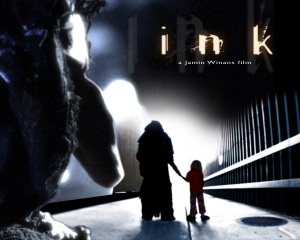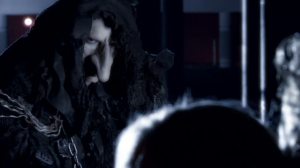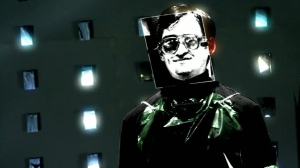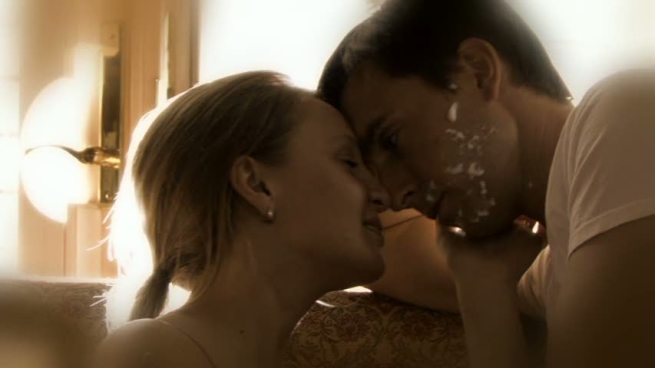 A question that’s rung in my head since first hearing about the movie Ink, was what relevance the title of the film held. From the first moments of the trailer, and subsequently the film, I knew I was in for a movie that had calculated its’ steps carefully, creating something in between an eloquent waltz and an algebra equation. I knew that the title was another vital part of the whole experience, and that deciphering it’s meaning was another key to unlocking the many mysteries that lay inside the delicate layers of Ink’s story.
A question that’s rung in my head since first hearing about the movie Ink, was what relevance the title of the film held. From the first moments of the trailer, and subsequently the film, I knew I was in for a movie that had calculated its’ steps carefully, creating something in between an eloquent waltz and an algebra equation. I knew that the title was another vital part of the whole experience, and that deciphering it’s meaning was another key to unlocking the many mysteries that lay inside the delicate layers of Ink’s story.
That story, written by Jamin Winans, is a tale of multi-dimensional dream weavers, consisting of one bad stable and one good one. The good ones, dubbed Storytellers, give us good dreams by visiting us in our rooms once we’ve fallen asleep and gently waving there hands slowly by our heads. The bad ones, called the The Incubi, give us the nightmares. Beyond the ability to grant dreams, these people also battle over the souls of those who are sleeping.

Ink's spectacular makeup and look help solidify him as our complicated, yet menacing antagonist.
This is more or less where our story begins. A drifter, one who is stuck in between life and death, named Ink is propositioned by the Incubi to steal the soul of a seemingly insignificant little girl named Emma, in exchange for the ability to become an Incubi himself. Emma’s estranged father, John, is also battling staggeringly high odds, both physically and emotionally, due to a demanding and stressful job, and the weight of his own guilt and shame. The rest is quite simply too exciting and emotionally propelling to spoil for the sake of this review.
The first thing that one notices about Jamin Winans film Ink, is that it is in an entire league of it’s own in terms of visual style. While some influences are noticeable, Jamin takes the idea of kinetic and potential energy in a movie to new heights. The pace is fluid, only jumping a beat to drive home a scene or a moment, then quickly snaps back into place, driving the narrative along briskly enough to demand a viewers full attention without overloading and confusing them. The editing is so precise, so flawless, that it begins to feel almost euphoric. Jamin manipulates the order of certain events, in order to keep viewers on there toes about where the story is heading. There is no point in the movie where I could clearly say what was going to happen next, and that feeling of wonderment and vulnerability is something that has stuck with me even through writing this piece. It’s a hypnotizing film, and it never sacrifices the gravity of what’s happening on screen in favor of giving you a flashy, “Hollywood” shot that only looks great on movie posters. This film exudes an aura of tremendous planning brought to life by even more impressive execution.

The cinematography is remarkable, looking even better when in full motion.
Hand in hand with the visual buffet, is the equally sublime audio package. From the old-timey camera snap-and-flicker sound effect used for when storytellers teleport in, to the visceral crunch of a perfectly placed uppercut, to the appropriate tinkering and manipulation of certain voices to help give them an other worldly feel, the effects are all nothing short of innovative. Everything sounds crisp and distinctive, and every action is accounted for. Holding all the aforementioned technical elements together is a subtle, oceanic, and deeply emotional score, written by Jamin Winans. The score is reminiscent of some of John Muprhy’s work, as well as some of Danny Elfmans’ dreamier, calmer material. But Jamin really shows he has the patience, style, and talent to not only create a great stand alone score, but also one that personifies and amplifies perfectly everything his film has to say. Not enough can be said about how much the score adds to the entire feel of the film, something not seen enough in the days of soundtracks where popular artists write a soulless song that supposedly represents the movie.

An Incubi, who brings nightmares.
Along with the groundbreaking special effects (see the reconstructing furniture fight scene for evidence of this) there is the cinematography of Jeff Pointer. All the different planes of existence in Ink’s world are accompanied by a strikingly different palette of colors and lighting techniques. It not only creates the appearance that they are entirely different dimensions, it becomes other dimensions altogether. Due to the digital filming techniques I am almost sure Jamin Winans used extensively while shooting Ink, he gains an incredible amount of control over lighting, filters, color correction and saturation, which he uses to great dramatic effect. They also function perfectly as cues that we have begun to look in on a different scene, and helps indicate silently where we are, who were are with, and with whom there alliances lay.
But if Ink is anything, it’s a damn good story. The story is so luminary, so rife with honest humanity and emotion that it’s near impossible not to invoke some kind of serious, introspective moment within you while watching. It’s not the kind of emotion that make boyfriends not want to go see the romance flick with their girlfriends, it’s the kind of emotion that’s intrinsic within the human conscious. It’s about loss, innocence, desire, motivation, and possibly above all, hope. The film makes some very philosophical observations on the sordid perils of everyday life, but it makes them in a passive, courteous way. It acknowledges that we are, to a degree, the sum of our parts and past experiences, but it also points out that there is always the opportunity for radical change. Jamin manages to ease his way into some very heady, intellectual space without losing sight of the plot and the characters I found myself heavily invested in. This alone is quite an achievement.

The sunny, serene dimension of the Storytellers.
All those points wouldn’t have been so well conveyed without actors who really seemed to understand the vision of Jamin. Consider that a non-issue though, as all the actors and actresses playing there roles without incident, with no one seeming out of place or terribly miscast. Extra credit must go to Chris Kelly for playing John and Jessica Duffy for playing Liev, whose performances were simply to sensational not to mention. There isn’t really much else I can say about the cast other then Jamin Winans must’ve have had at least some, if not all, of the actors and actress’s in mind when he wrote the script, because the roles seem tailor made for the individuals playing them. They are always shown in their best light, the emotion that Jamin squeezed from them seems as genuine as anything I’ve even seen. If there’s one thing that’s evident in independent film making, it’s the passion of those involved. It’s the whole reason independent film making still exists, because I assure you, it isn’t for the money. In Ink’s case, the movie is overflowing with determination and fire, which helps envelope the viewer in the vibrant, awe-inspiring world that this magical yarn is spun in.
The only obstacle I can see any audience having a major problem with, would be the sheer emotional investment and outside the box thinking a movie this cavernous can require for full enjoyment and understanding. It’s all about invading the comfortable areas of your life, it’s about turning the mirror on yourself, and it’s about the stuff all of us have deep inside, regardless of whether or not we pretend it’s not there. It’s story is not only timely, but timeless. There is no restriction on when a tale like this could be told.

Our Storytellers along with their quirky, philosophical guide, The Pathfinder.
In the end, I think I’ve found the answer to my original question, and that the answer may be that we are all Ink. We are all different colors, different viscosity, and different blends. We are the instruments of change, both good and bad, but we are not immune to them ourselves. The randomness of life can be extremely disruptive, and seem devoid of pattern, reason and predictability, but just because the last few moments, days, or years have blindsided you, it doesn’t mean you are lost forever. At least, that’s how I saw it.
Jamin Winans has concocted a potent narrative, one that is as focused as can be, while still leaving enough room for individual interpretation. It is assembled in such a way that not only promotes, but encourages multiple viewings. Technically speaking, there is nothing that could be done better within the budget, and the acting is all fitting, bringing believability and heft to each role, while naturally allowing the main figures to steal the show. Ink deserves a special place inside the hollowed halls of great intellectual cinema, here’s to hoping it takes its rightful places in that gallery one day.
